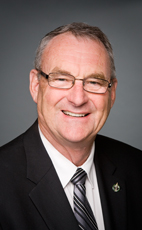Mr. Speaker, I am the chair of the Standing Committee on Aboriginal Affairs and Northern Development and I want to assure the House that the committee is looking forward to recommending policies to the government that will improve aboriginal self-determination.
It gives me great pleasure to speak in the House today to the motion of the hon. member for Winnipeg South Centre. The debate today is one of utmost importance and allows our government to highlight the steps we are taking to improve the lives of aboriginal Canadians.
Over the last 10 years under the Liberal government we saw the living conditions of aboriginals decrease despite the constant rhetoric from the Liberal Party. During the Liberals' time in office they spoke constantly of concern for aboriginals and yet housing conditions declined and the water on some reserves became undrinkable.
The Conservative government has taken concrete steps to address these concerns. I want to talk about the progress this government made during the first 100 days in office toward the improvement of the quality of life of aboriginal peoples in all parts of Canada. This government is moving quickly to develop real solutions to real problems facing aboriginal people in this country.
During our first 100 days as government, the Minister of Indian Affairs and Northern Development and Federal Interlocutor for Métis and Non-Status Indians has taken decisive steps on several fronts that hold the promise of better lives for aboriginal people, both on and off reserves and for northerners.
In March the minister launched a plan of action to address drinking water conditions in first nations communities. This plan of action includes implementation of the protocol of safe drinking water for first nations communities. The protocol contains standards for design, construction, operation, maintenance and monitoring of drinking water systems in first nations communities and is intended for use by first nations staff responsible for water systems.
This plan also includes mandatory training for all treatment plant operators, an important step that will affect the long term success of this approach to the problem of unsafe drinking water. The plan addresses the critical need for a regime to ensure that all water systems have the oversight of certified operators. Various initiatives, such as the remote monitoring of water systems and the contracting of independent certified operators to provide necessary oversight, will also be put in place. The plan also includes complete and specific remedial plans for first nations communities with serious water issues, starting with the 21 communities most at risk.
Just last month the minister announced that a panel of experts would advise on the appropriate regulatory framework. Its final options paper for the new framework will be delivered by September 2006. First nations have been waiting for this kind of decisive action on water for a very long time.
As well, this government has given a clear commitment to report on the progress that is made on a regular basis.
The expert panel will hold public hearings beginning this week in Whitehorse. At these hearings participants will have the opportunity to provide their views and suggestions on what should be regulated and what legal framework should be used. The panel's interim report on regulatory options will be submitted to the minister by September 2006.
Our commitment to improve the lives of aboriginal people was stated in the Speech from the Throne:
Over the course of its mandate, and starting with the clear priorities set out today, the Government will work diligently to build a record of results. It will promote a more competitive, more productive Canadian economy. It will seek to improve opportunity for all Canadians, including Aboriginal peoples and new immigrants.
We followed up on our commitment with the federal budget, which will provide $450 million over the next two years for initiatives for education, women, children and families, and water and housing on reserve. It will also provide $300 million for aboriginal housing off reserve and another $300 million for affordable housing in the territories.
Our first budget established a $500 million fund. Over 10 years, this fund will be used to support initiatives from local communities to mitigate any negative socio-economic effects arising out of the Mackenzie gas project.
In total, our first federal budget in 2006 confirmed funding of over $3.7 billion in support of aboriginal peoples and northerners. This was in addition to the many measures in the budget that will benefit all Canadians, including aboriginal peoples, such as $3.7 billion for the universal child care benefit and $370 million for apprenticeships, tradespeople and post-secondary education, which also embraces the aboriginal peoples.
This is in addition to the 2006-07 main estimates of $6.3 billion, which includes approximately $366 million or 6.2% more than last year's main estimates for Indian and Northern Affairs Canada.
Not only has this government made substantial investments in programs and services that will affect the future, as I have outlined, we have announced a major investment to right some of the wrongs of the past.
In May, our government approved the Indian Residential Schools Settlement Agreement and immediately launched an advance payment program. This is a $2.2 billion program to address the legacy of residential schools.
As Minister Prentice stated at the time of the announcement, the settlement agreement--

